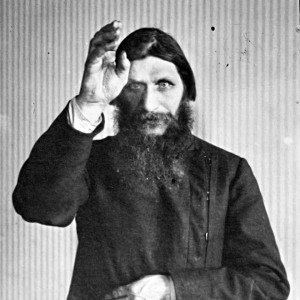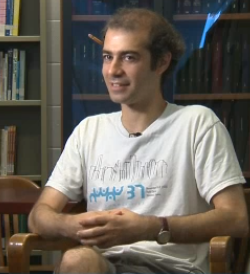The value of a tattoo in English
Andy Averill sent in the following picture of a Chinese person with the English word "value" tattooed on her right shoulder:
Read the rest of this entry »
Andy Averill sent in the following picture of a Chinese person with the English word "value" tattooed on her right shoulder:
Read the rest of this entry »
Perfect lexicographical storms don't come along like this very often. On Sunday night, Miley Cyrus egregiously "twerked" at MTV's Video Music Awards, in a performance that quickly became National Conversation #1 (even outpacing Syria). About 48 hours later, Oxford Dictionaries announced its quarterly update of new words — with the Associated Press and others trumpeting the news far and wide — and lo and behold, there was twerk, defined as a verb meaning "dance to popular music in a sexually provocative manner involving thrusting hip movements and a low, squatting stance."
Read the rest of this entry »
For the last week, the whole Chinese world was transfixed by the trial of Bo Xilai, the fallen star of the Chinese Communist Party. Among the lurid details of crime and corruption that emerged, perhaps none has elicited greater excitement than Bo's revelation that his wife, Gu Kailai (already convicted of the murder of a British businessman named Neil Heywood), and his "top cop", Wang Lijun (already convicted of treachery and treason), carried out an illicit love affair.
The expressions Bo used to describe the romance between his wife and his chief of police have challenged the translation skills of China's journalists.
Read the rest of this entry »
This year's Penn Reading Project book is Adam Bradley's Book of Rhymes: The Poetics of Hip Hop. In my discussion group yesterday afternoon, several participants complained that some important things about the "poetics" of rap are lost in a purely textual presentation of the lyrics. One student observed that in pieces he knows, the rhythm is there in the written form — but the lyrics for pieces that he doesn't know seem flat and lifeless in comparison.
There are good reasons that this is more true for the works of Melle Mel or Jay Z than for Elizabeth Barrett Browning or W.H. Auden, I think.
One of the advantages of the weblog format is the combination of text, images, and audio or video clips, so for this morning's Breakfast Experiment™ I decided to present a small exploration of the "poetics of hip hop" in a multimedia — and somewhat quantitative — framework.
This exercise will clarify why transcriptions of the lyrics, even with bold-face indications of stress, are missing an important dimension. The lines' scansion depends not only on the syllable sequence and on where the performer puts phrasal stresses, but also on the alignment of the syllables with the musical meter. This alignment is not automatic or always obvious — it has artistically-relevant degrees of freedom beyond those available in most other genres of text setting.
For those whose appraisal of Bradley's book was (interpreting freely) "not enough vampires and car chases", this will probably make things worse — you have been warned.
Read the rest of this entry »
That's the title of an article by Mark Schreiber in yesterday's (Aug. 25, 2013) Japan Times. It has to do with a topic that we've discussed quite a bit on Language Log in recent weeks and months (e.g. here, with references to earlier posts on the subject): borrowings to and from Japanese.
Since the article is succinct, lively, and exemplary in its presentation, seemingly designed with a pedagogical purpose in mind, I shall quote it entirely:
Read the rest of this entry »
Didi Kirsten Tatlow is trying to trace the roots of the word xiānsheng 先生 (lit., "one who was born earlier / first / before" –> "sir; mister / Mr.; teacher; gentleman; doctor / Dr. [dated]"). She writes:
Today of course it's applied to all men, women being nǚshì 女士 ("Ms.; lady; madam"); once upon a time I believe it meant a teacher. Yet a woman considered especially smart may be given the honorific xiānsheng 先生 (!).
Am wondering about its origins and when/how it came to be applied to all men, and whether perhaps it came from the Japanese, like many other terms in modern times (i.e., post 1911 or even earlier?). Does anyone have any light to shed, with references?
Read the rest of this entry »
Here are two anniversarial tweets that appeared Friday evening. The first is from the WhiteHouse.gov Technology account, celebrating the anniversary of the release of the source code for We the People:
Happy #OpenSource-iversary @wethepeople! A year ago today we released the code, see what we've been up to since: http://t.co/Bvwu35xh8h
— WH.gov Technology (@WHWeb) August 23, 2013
The second is from Chris Messina, a.k.a. the hashtag godfather, on the occasion of the sixth anniversary of his proposal of the hashtag convention on Twitter:
BTW, little secret: TODAY is the 6th #hashtagiversary. I totally punk'd CNBC. DON'T TELL ANYONE!!!!!!!
— Chris Messina™ (@chrismessina) August 24, 2013
(Messina didn't actually coin hashtag on that fateful day in 2007 — that was done a few days later by Stowe Boyd, another early Twitter adopter. See the Spring 2013 installment of "Among the New Words" in American Speech [pdf], which I co-wrote with Charles Carson, as well as Boyd's own recent post on the subject.)
Read the rest of this entry »
Katie J.M. Baker, "Ladies, What's Up With the 'I Feel Like' Verbal Tic?", Jezebel 8/23/2013
When I search my Gmail inbox for the phrase "I feel like," infinity results come up. "I feel like this particular story's very up your alley," a professional acquaintance wrote. "I feel like this might be the transitional stage to Federici's utopia," a woman in my book group joked. "I feel like I look too meek in my new profile pic," I worried to a friend. "I feel like I've done nothing of worth lately," another friend confided in me. "I feel like I'm being unhelpful." "I feel like it was important." "I feel like I have to reconcile my expectations."
We are feeling so many feelings, and we are very aware that we are feeling these feelings. But most young women I know are self-conscious about how often they qualify their emotions with "I feel like." If it's how we feel, do we need to drop an "I feel like" as a prelude to our feelings?
Here's what I don't like about "I feel like," a phrase I use constantly:
* It sounds a little indulgent, verging on narcissistic; when I say "I feel like" I feel like (ha) a touchy-feely liberal girl who learned to talk about her feelings in school.
* It evokes Carrie Bradshaw's pseudo-pensive "I couldn't help but wonder…"
* "I feel like" seems sheepish. I don't want to apologize for my feelings!
Read the rest of this entry »
This afternoon I received in the mail the following book:
Jason Q. Ng. Blocked on Weibo: What Gets Suppressed on China's Version of Twitter (and Why). New York and London: The New Press, 2013.
In this wonderful volume, Jason Q. Ng runs all the terms in the Chinese-language version of Wikpedia through the search function of Sina Weibo to discover which ones are censored. The results are mind-boggling in their ramifications.
Read the rest of this entry »
 … that Grigory Rasputin predicted the world would end. This has not gotten much coverage in the U.S., despite links to zombies, marijuana legalization and solar flares.
… that Grigory Rasputin predicted the world would end. This has not gotten much coverage in the U.S., despite links to zombies, marijuana legalization and solar flares.
I've discovered a remarkable connection to linguistic theory, but have decided not to reveal it so as avoid unnecessary panic during our remaining hours.
Bradley Manning, just recently sentenced for leaking classified documents to Wikileaks, has released a statement announcing, "I am Chelsea Manning. I am a female." Manning also gave instructions on his-now-her preferred personal pronouns:
I hope that you will support me in this transition. I also request that, starting today, you refer to me by my new name and use the feminine pronoun (except in official mail to the confinement facility).
News organizations are struggling today with the pronominal quandary in reporting on Manning's new transgender identity. On Slate's XX Factor blog, Amanda Marcotte writes:
The transition is already awkward. Earlier today, the New York Times headline on a Reuters story on Manning's announcement danced around gender pronouns: "Manning Says Is Female and Wants to Live as a Woman." Clearing up the grammar for an updated headline just made the situation worse: "Manning Says He Is Female and Wants to Lives as a Woman." Well, if "he" is female, then isn't the word "she"? Manning has finally had a chance to express her gender preferences. Since most journalists had a notion this was coming, using confusion or surprise as an excuse for those headlines isn't an option.
Read the rest of this entry »
 Aaron Dinkin (formerly known as Dr. Whom) on Facebook:
Aaron Dinkin (formerly known as Dr. Whom) on Facebook:
Just got unexpectedly interviewed by Global News. Topic: Is social media ruining the English language? My answer: no.
He adds:
Just you watch, everyone, they'll edit it to take whatever I say out of context and make it sound like I'm buying into the premise.
And after the piece appeared:
Yep, that's what happened:
Read the rest of this entry »